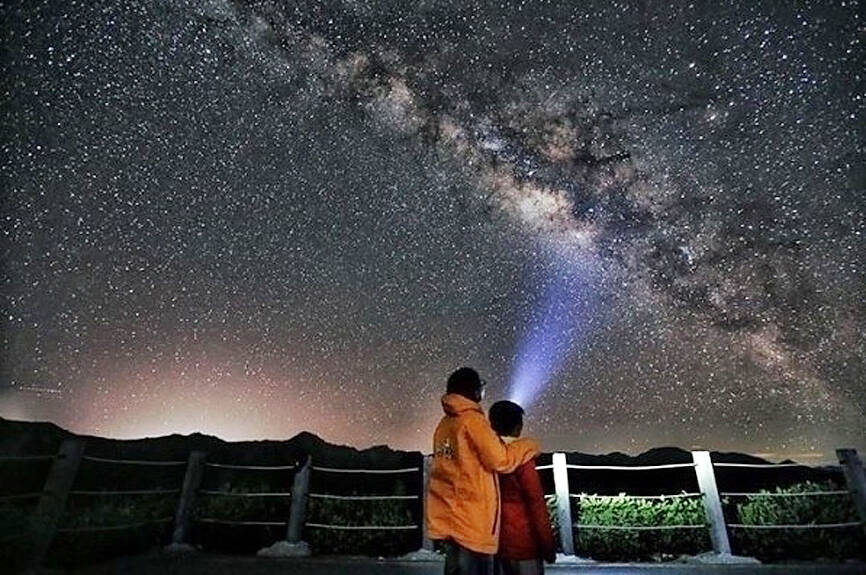Taiwan should adopt legislation similar to that of other countries to combat light pollution, New Power Party Legislator Chen Jiau-hua (陳椒華) said jointly with the Taiwan Dark-Sky Association on Saturday.
Since 2015, there have been about 2,300 annual cases of light pollution reported to authorities in Taipei and New Taipei City, she said.
However, while the nation has the Air Pollution Control Act (空氣污染防制法) to regulate air pollution, and the Noise Control Act (噪音管制法) to handle noise complaints, it has no laws to deal with light pollution, she said.

Photo courtesy of the Cingjing Tourism Association
“The Environmental Protection Administration (EPA) promulgated guidelines for preventing light pollution in 2021, but there are no legal or administrative implications for those guidelines,” she said.
“The EPA has a negative attitude toward the issue,” she added.
International Dark-Sky Association executive director Ruskin Hartley said that tackling light pollution is a global trend.
Hartley, who recently visited Lienchiang County, cited local bylaws there that prevent light pollution as an example of this trend.
However, even there, people face hundreds of Chinese fishing boats that traverse nearby waters from June to October every year, using bright lights while fishing at night, he said.
Too much light is a waste of energy and also negatively impacts nearby ecology, Taiwan Dark-Sky Association chairman Axiou Lin (林正修) said.
“Excessive light can even impact people’s health, and things like the brightness and type of light, and the angle of light installations are all things that need attention,” he said.
“I hope the government can give the issue more serious thought,” he added.
Introducing legislation to tackle light pollution would also help the government reach its net zero carbon emissions goal, by using energy more efficiently, Chen said, adding that this could be done through the use of more energy-efficient lighting.
Chen said she asked the EPA to deliberate with government ministries, non-governmental organizations and experts on possible legislation to tackle light pollution, and to come up with a proposal within three months.
She also asked the Construction and Planning Agency to discuss possible changes to building standards to require more efficient lighting in all new buildings, the Directorate General of Highways to discuss more efficient street lighting, and the Council of Agriculture to look into more efficient lighting for fishers, she said.
The Bureau of Standards could consult with the International Commission on Illumination or other international standards to help it draft lighting standards for Taiwan, she said.

A preclearance service to facilitate entry for people traveling to select airports in Japan would be available from Thursday next week to Feb. 25 at Taiwan Taoyuan International Airport, Taoyuan International Airport Corp (TIAC) said on Tuesday. The service was first made available to Taiwanese travelers throughout the winter vacation of 2024 and during the Lunar New Year holiday. In addition to flights to the Japanese cities of Hakodate, Asahikawa, Akita, Sendai, Niigata, Okayama, Takamatsu, Kumamoto and Kagoshima, the service would be available to travelers to Kobe and Oita. The service can be accessed by passengers of 15 flight routes operated by

GIVE AND TAKE: Blood demand continues to rise each year, while fewer young donors are available due to the nation’s falling birthrate, a doctor said Blood donors can redeem points earned from donations to obtain limited edition Formosan black bear travel mugs, the Kaohsiung Blood Center said yesterday, as it announced a goal of stocking 20,000 units of blood prior to the Lunar New Year. The last month of the lunar year is National Blood Donation Month, when local centers seek to stockpile blood for use during the Lunar New Year holiday. The blood demand in southern Taiwan — including Tainan and Kaohsiung, as well as Chiayi, Pingtung, Penghu and Taitung counties — is about 2,000 units per day, the center said. The donation campaign aims to boost

ENHANCING EFFICIENCY: The apron can accommodate 16 airplanes overnight at Taoyuan airport while work on the third runway continues, the transport minister said A new temporary overnight parking apron at Taiwan Taoyuan International Airport is to start operating on Friday next week to boost operational efficiency while the third runway is being constructed, the Ministry of Transportation and Communications said yesterday. The apron — one of the crucial projects in the construction of the third runway — can accommodate 16 aircraft overnight at the nation’s largest international airport, Minister of Transportation and Communications Chen Shih-kai (陳世凱) told reporters while inspecting the new facility yesterday morning. Aside from providing the airport operator with greater flexibility in aircraft parking during the third runway construction,

American climber Alex Honnold is to attempt a free climb of Taipei 101 today at 9am, with traffic closures around the skyscraper. To accommodate the climb attempt and filming, the Taipei Department of Transportation said traffic controls would be enforced around the Taipei 101 area. If weather conditions delay the climb, the restrictions would be pushed back to tomorrow. Traffic controls would be in place today from 7am to 11am around the Taipei 101 area, the department said. Songzhi Road would be fully closed in both directions between Songlian Road and Xinyi Road Sec 5, it said, adding that bidirectional traffic controls would